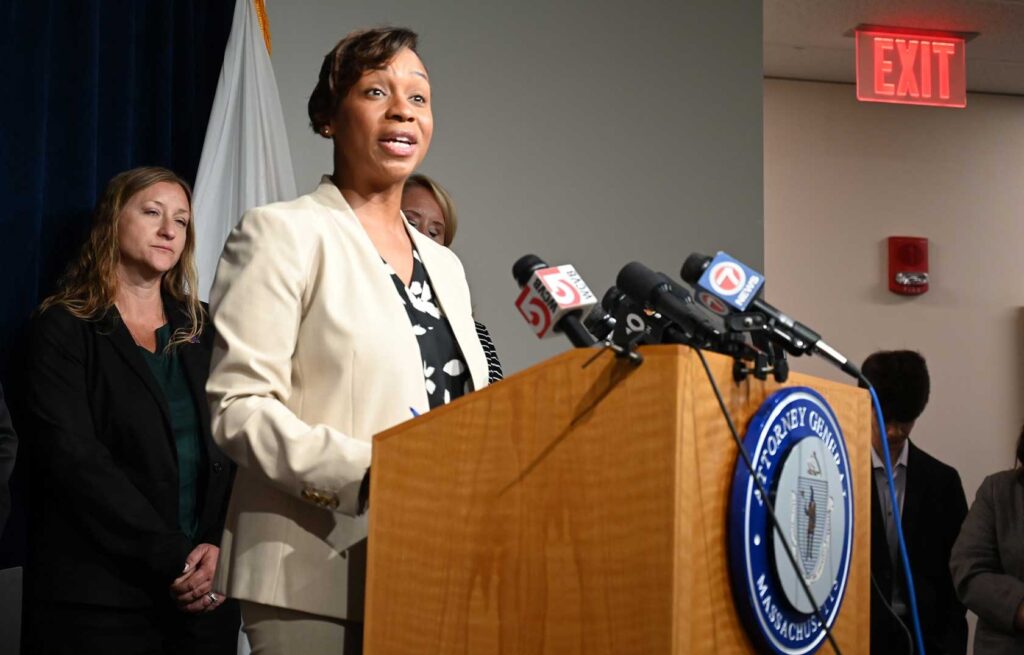State v. town of Milton as Mass. top court hears arguments in MBTA zoning fight

Representatives for the attorney general and town of Milton delivered arguments in front of the Supreme Judicial Court Oct. 7 about the attorney general’s ability to compel the municipality to adopt new zoning rules under a state law that would create more multifamily housing near public transit.
The case centers on the MBTA Communities Act, a 2021 law that created requirements around municipalities creating zoning districts with increased multifamily housing in proximity to MBTA transit. In February, voters in Milton rejected the proposed zoning district that had been approved by the town government.
“Our argument is very simple: When the statute says that covered communities shall create a compliant zone, ‘shall’ means ‘shall,’” Attorney General Andrea Campbell said in a press conference before the oral arguments.
Under the law, 177 communities — 84 that host MBTA rapid transit, commuter rail, buses or ferries and 93 that share a border with cities and towns served by the MBTA — are required to establish at least one zoning district “of reasonable size” where multi-family housing can be built without need for a variance or exception. That district should be within a half-mile of public transportation where possible.

The Mattapan Trolley rides along the Milton/Boston line. The state’s Supreme Judicial Court heard oral arguments last week in the lawsuit between Attorney General Andrea Campbell and the town of Milton, over its noncompliance with the MBTA Communities Act. BANNER FILE
Residents of the town of Milton, which on its northern border is lined by the Mattapan Trolley, voted in mid-February to override a proposed land-use plan that had been developed and approved by its Town Meeting that would have created the required zoning district.
Campbell and her office sued the town two weeks later, at the end of February.
In the argument for the attorney general’s office, Assistant Attorney General Eric Haskell argued that while citizens of Milton had a right to provide input on the zoning district and the process of developing it, they do not have the ability to override state law requiring its creation.
The concept came back to something Campbell and supporters pointed to at the press conference: The MBTA Communities Act provides flexibility in what the zoning district looks like, but not if it can exist or not.
“The law is flexible, it understands that each municipality is different, and each municipality may need to figure out which part of their community is best to build the housing,” Campbell said. “It offers that flexibility; it offers that creativity.”
During the oral arguments, Haskell pointed to a 1943 law passed by the state that required municipalities to treat water in a certain way in response to the ongoing World War II. When the town of Hudson rejected it, the Supreme Judicial Court then ruled that even though the town was entitled to its democratic processes, it could not evade the mandate. He suggested the same reasoning applied regarding the MBTA Communities Act.
“The town can choose whatever plan it wants to attempt to comply with this thing, within the boundaries of the statute and the guidelines,” Haskell said. “Our point is the town needs to enact something.”
One key piece of Milton’s argument against the suit is whether the attorney general’s office has the authority to enforce the law.
Under the statute, as passed, the legislature identified three sources — and later added a fourth — of grant funding the state offers to cities and towns that a community living along the MBTA would be ineligible for if they are not in compliance with the act.
The consequence, Martin said in his argument for Milton, is how the law is meant to be enforced.
“When the legislature creates a statutory duty or right, then the legislature decides what the consequence will be for non-compliance,” he said.
But Haskell for the attorney general’s office, as well as Justice Scott Kafker, questioned whether the withholding of the grants is an effective consequence.
“This is a significant piece of legislation,” said Kafker. “We’re dealing with one of the biggest problems in Massachusetts, and the legislature’s only remedy — if you don’t combine with their ‘shall’ language — is three minor grant programs that most towns haven’t gotten money on.”
Haskell said that Milton hadn’t received any funding from the four grant programs since 2012. A similar trend is true across many of the municipalities covered by the MBTA Communities Act.
He said that, in the past three years, less than two-fifths of the 177 cities and towns affected by the legislation have received funding through the MassWorks program, a local infrastructure grants program that is one of the funding sources that can be withheld if a town is not in compliance.
Martin argued that the question of whether it was an effective method of enforcement ultimately fell to the legislature. He pointed to that addition of a fourth grant program that could be withheld as an indication that the legislature is aware of that role.
“If they wanted to provide for something more, they could have,” Martin said.
During the press conference ahead of the arguments, Campbell said she had concerns that if the court rules in favor of Milton, there could be a domino effect of other municipalities moving away from the MBTA Communities Act. She also said she worries about the impact a decision in favor of the town could have on the state’s ability to mandate what municipalities do.
“No one should be able to pick and choose which laws they want to comply with,” she said. “I hope the court will see the significant consequences of continuing to allow Milton’s noncompliance.”
So far, Milton is the only city or town currently officially out of compliance, but a number of municipalities have yet to hit the deadline for approving the zoning district. Across the state, 130 of the communities impacted by the law have until the end of the year, though some of those communities have already adopted plans to create the required district.
As of Oct. 7, 36 municipalities were fully compliant, Campbell said.
Holden, in Worcester County, has yet to reach its deadline but said it will not draft a plan to meet compliance with the law.
Behind the suit against Milton, Campbell said, is the goal to support state efforts in addressing its housing shortage, what she called the “number one challenge” facing Massachusetts.
“The lack of affordable housing is driving people out of our great state,” she said. “It’s making it tougher for teachers, nurses, first responders and public servants to call the commonwealth their home. It’s squeezing young families, making it hard for them to stay in the neighborhoods they grew up in. It’s hitting our elders, forcing them to choose between living near loved ones and having access to basic amenities.”
It’s something that supporters at the press conference also said impacts business and the economy.
“Dense multifamily housing in close proximity to public transportation is critical to opening the doors of new opportunities for career paths, for training, for access to health care, for access to education, and it ensures that our communities across the state remain connected,” said Chrissy Lynch, president of the Massachusetts AFL-CIO Union. “As we tackle our state’s housing crisis, the integrity of innovative, solutions-driven laws must be protected.”
Brooke Thomson, president of Associated Industries of Massachusetts, said that almost every employer she has spoken to recently has had an employee or candidate who said they love Massachusetts but can’t afford to stay.
“The housing crisis impacts the economy and our workforce. The soaring cost of buying a home in Massachusetts is driving our best and brightest to less expensive regions of the country,” she said.
They pointed to legislation like the MBTA Communities Act, in tandem with other legislative actions like the housing bond bill that was passed this summer as solutions that have to work in tandem.
“It will take many tools to create the homes that we need, and the state is putting these tools in place,” said Rachel Heller, CEO of the Citizens’ Housing & Planning Association.
But municipalities, too, they said, must work together to address the issue. Cambell said that the crisis “absolutely demands a statewide response.”
Jesse Kanson-Benanav, executive director at Abundant Housing Massachusetts, said that it will take all the state’s cities and towns to create the needed housing.
“Only together, with every community doing its part, can we make the vision of an inclusive, sustainable, economically competitive Massachusetts a reality for everyone,” he said.






